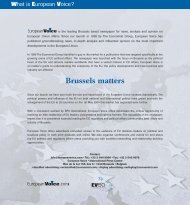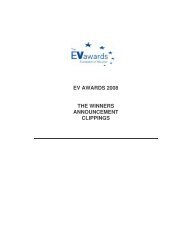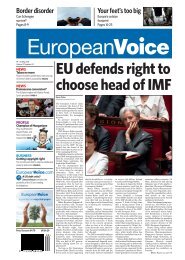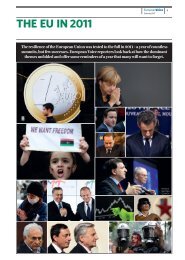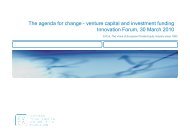special report - European Voice
special report - European Voice
special report - European Voice
You also want an ePaper? Increase the reach of your titles
YUMPU automatically turns print PDFs into web optimized ePapers that Google loves.
COMMENT<br />
30 May 2013<br />
9<br />
On the wrong side of transparency<br />
REUTERS<br />
Carl Dolan explains why companies should not fear new<br />
EU transparency rules<br />
The robust response of<br />
Apple’s chief executive,<br />
Tim Cook, to a US<br />
Congressional hearing last<br />
week that investigated the<br />
tech giant’s use of a complex network<br />
of offshore vehicles to minimise its tax<br />
bill, was: “We pay all the taxes we owe,<br />
every single dollar. We not only comply<br />
with the laws, but we comply with the<br />
spirit of the laws”.<br />
This is, of course, exactly as it should<br />
be. For some reason, however, Apple is<br />
very shy of sharing the good news more<br />
widely. A Transparency International<br />
<strong>report</strong> published last year showed that<br />
it disclosed precisely nothing about the<br />
corporate income tax it paid in the<br />
various countries that it operates. It<br />
was ranked 91 out of the 105 global<br />
companies that were assessed on their<br />
disclosure practices. Apple may be near<br />
the bottom of the transparency class,<br />
but in terms of publicising the<br />
information about where it pays its<br />
taxes it is merely average. Of the 105<br />
companies we surveyed, 85 revealed<br />
nothing to the wider public about the<br />
corporate income tax they pay to<br />
governments around the world.<br />
Given this state of affairs and the<br />
drip-feed of revelations about the<br />
aggressive tax-avoidance strategies<br />
used by multinational corporations<br />
over the past few years, it should come<br />
as no surprise to Cook that politicians<br />
are unwilling to take statements about<br />
good corporate citizenship on trust. At<br />
last week’s summit on tax evasion,<br />
<strong>European</strong> Union leaders backed an<br />
initiative that would require the largest<br />
<strong>European</strong> companies to disclose<br />
detailed information about taxes paid<br />
and other financial information for<br />
every country where they operate – a<br />
mandatory ‘country-by-country’<br />
<strong>report</strong>ing standard.<br />
Such a standard has long been<br />
advocated by those who believe that a<br />
step-change is required in corporate<br />
transparency. It is now a reality for the<br />
oil, gas, mining and banking sectors,<br />
following hard-fought legislative<br />
campaigns in Brussels over the past<br />
two years. If those campaigns are<br />
anything to go by, we should expect<br />
EU bashing and olive oil<br />
Alberto Alemanno considers<br />
a tale of Euroscepticism,<br />
political opportunism and<br />
a <strong>European</strong> Commission<br />
‘own goal’<br />
In the aftermath of the last<br />
<strong>European</strong> Union summit, one of<br />
the many provisions proposed by<br />
the <strong>European</strong> Commission within<br />
the framework of its action plan<br />
for the olive-oil sector unexpectedly<br />
gained global attention.<br />
The provision, which had already won<br />
member states’ backing, would have<br />
required that restaurants serve olive oil in<br />
sealed, clearly labelled and non-reusable<br />
containers, instead of relying on refillable<br />
containers. The UK’s prime minister,<br />
echoed by his Dutch counterpart, publicly<br />
attacked the Commission’s adopted<br />
proposal by dismissing it as “exactly the<br />
sort of area that the <strong>European</strong> Union<br />
needs to get right out of”. While Dacian<br />
Ciolos˛, the <strong>European</strong> commissioner for<br />
agriculture, initially defended the<br />
proposal as a way to promote quality olive<br />
oil and to protect consumers from fraud,<br />
he rapidly withdrew the measure,<br />
declaring that the ban was “not<br />
formulated in such a way as to assemble<br />
widespread support”.<br />
The tale of the proposal captures many<br />
of the misperceptions surrounding the<br />
EU’s work, but also reveals how a rule<br />
that has the member states’ blessing can<br />
be overturned by a minority.<br />
First, it illustrates the lack of<br />
understanding of the scope of the<br />
regulatory authority granted to the EU.<br />
While the Commission proposes around<br />
60-70 legislative acts, it adopts – together<br />
with the member states – around 2,000<br />
measures implementing previously<br />
agreed legislation every year. The olive-oil<br />
proposal fell into the latter category.<br />
Second, it confirms politicians’<br />
tendency to fuel misinterpretations of the<br />
EU to suit their immediate political<br />
calculus. In particular, it shows how easy<br />
it is to turn the public against the EU by<br />
depicting a rule supposedly aimed at<br />
consumer protection as the umpteenth<br />
attempt to over-regulate EU citizens’<br />
lives. As such, it illustrates once more the<br />
cynicism of leaders who blame the Union<br />
for systematically over-reaching the<br />
loud cries of protest from the business<br />
community, pointing to the mounting<br />
pile of red tape, the costs of compliance<br />
and the unnecessary intrusiveness of<br />
the new rules.<br />
This would be short-sighted and<br />
wrong. Assuming that most chief<br />
executives share Cook’s view of their<br />
firm’s compliance on tax matters, they<br />
have nothing to fear from a more<br />
informed debate about corporate tax<br />
policy. Companies collect all this data<br />
in any case for accounting purposes, so<br />
the cost of putting it all together for<br />
public disclosure will not be<br />
significant. More importantly,<br />
companies have the opportunity to<br />
press ‘re-set’ on their relations with<br />
governments, investors and the wider<br />
public, by embracing a new standard of<br />
transparency.<br />
These relations have been soured<br />
lately by the perception – perhaps<br />
unjustified – that companies have not<br />
been shouldering their fair share of the<br />
recessionary burden. While highly<br />
profitable enterprises continue to<br />
stockpile cash reserves – as much as<br />
$1.8 trillion (€1.4 trillion) by US<br />
corporations alone – there is growing<br />
frustration that the benefits have not<br />
been felt more widely, in the form of a<br />
exercises of the very same regulatory<br />
powers that they have entrusted to the<br />
EU.<br />
Hence, the trivial, yet frequent, claim<br />
that the EU, at times of economic<br />
difficulties, had better things to do than<br />
regulating bottles of olive oil carries<br />
limited credibility. Denying multi-tasking<br />
ability to a political system is like<br />
suggesting that when one of us breaks a<br />
leg she should not breathe anymore.<br />
More remarkably, this story teaches us<br />
that even once a rule has gained the<br />
majority support of member states (even<br />
though not a qualified majority vote) and<br />
has been adopted, it is still possible to get<br />
it withdrawn if political leaders of the<br />
countries that were left in minority are<br />
capable of spinning that story as the latest<br />
EU attempt at ‘regulating everything’.<br />
The most pernicious effects of this<br />
approach are made possible by<br />
widespread ignorance and a profound<br />
lack of understanding of the EU’s basic<br />
functioning. Attacked by the disease of<br />
Euroscepticism generated by a few<br />
political leaders, public opinion behaves<br />
like a human body whose immunity<br />
system is deficient. By not having the<br />
right antibodies, public opinion does not<br />
react to the disease, allows it to gain<br />
ground, and even accelerates its spread.<br />
It is the task of the Commission, as the<br />
holder of the monopoly of legislative<br />
higher tax-take, increased investment,<br />
or dividends to shareholders. It is<br />
no wonder that a Eurobarometer<br />
survey published this year <strong>report</strong>ed<br />
that 41% of <strong>European</strong> citizens felt that<br />
the overall impact of business on<br />
society was negative. More tellingly,<br />
two-thirds of citizens did not feel<br />
informed about company efforts to<br />
behave responsibly.<br />
EU companies have lost the trust of<br />
their heartlands. In aspiring to be<br />
global players they have forgotten that<br />
accountability structures are still<br />
primarily national or regional.<br />
Regaining trust can start with firms<br />
disclosing detailed information about<br />
their local impacts – not just taxes<br />
paid, but also capital investments,<br />
community contributions and<br />
donations to political parties. Only<br />
then will citizens have a more complete<br />
picture of the contribution that a<br />
company makes to society.<br />
It is an agenda that companies<br />
should be happy to embrace, rather<br />
than once again positioning themselves<br />
on the wrong side of a new tide of<br />
transparency.<br />
Carl Dolan is a senior policy officer at<br />
Transparency International EU.<br />
initiative, to promote the development<br />
of the right antibodies against this<br />
manipulation of public opinion.<br />
To do so, the Commission should<br />
systematically engage in EU-wide<br />
stakeholder consultations while<br />
assessing the impact of its proposed<br />
rules.<br />
Unfortunately, in this case there was<br />
no impact assessment of the contested<br />
provision. As Ciolos˛ conceded, the<br />
Commission therefore could not<br />
effectively illustrate the merits nor prove<br />
the possible effects of the rule. What is<br />
more, he could not claim to have<br />
consulted with all relevant stakeholders.<br />
This explains why the Commission,<br />
which proposed the rule and mobilised a<br />
majority of member states in support of<br />
this measure, eventually did not stand<br />
by its own proposal.<br />
Only a highly formalised, evidencebased<br />
and participatory decisionmaking<br />
process could provide the right<br />
antibody against politically driven<br />
Euroscepticism. At a time of growing<br />
disaffection with the EU, this should be<br />
the lesson learned for the Commission<br />
from the olive-oil tale.<br />
Alberto Alemanno is a Jean Monnet professor<br />
of EU law and risk regulation and director of<br />
the HEC-NYU EU Regulatory Policy Clinical<br />
Programme.




